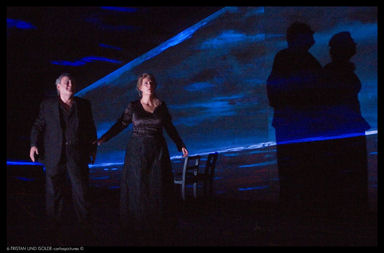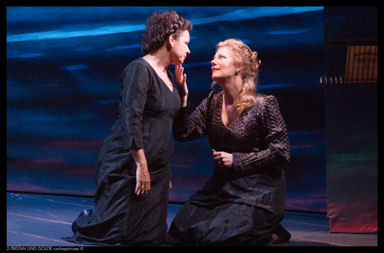Wagner, Tristan und Isolde:
(New Production) Soloists, Orquesta
Sinfónica del principado de Asturias, Coro de la
Ópera de Oviedo /conductor,Maximiano Valdés.
Teatro Campoamor de Oviedo, Spain, 15.9.2007 (JMI)
Production:
Director: Alfred Kirschner
Sets and Costumes: María Elena Amos
Lighting: Eduardo Bravo.
Cast:
Tristan: Jon Frederic West
Isolde: Jayne Casselman
Brangaene: Lioba Braun
Kurwenal: Christopher Robertson
König Marke: Andrew Greenan
Melot: Enrique Sánchez Ramos

Jon Frederic West
and Jayne Casselman
After the Civil War there was almost no public
initiative for opera in Spain. This void was
fulfilled until the end of 70’s by private
organisations, which sprang up in many different
cities under the name of Asociaciones de Amigos
de la Ópera (Opera Friends Associations.) They
organized opera performances in a very precarious
way, considering the lack of theatres,
professional orchestras and choruses in most
places but thanks to these organizations,
opera maintained a presence during those dark
times and some are still running their opera
seasons today, particularly in Bilbao, Oviedo and
the Canary Islands. One way or another, private
sponsors and public funding have become available
and the quality of performances has improved
dramatically.
Oviedo celebrates its 60th opera season
this year and is still run by a private
foundation, Opera de Oviedo, headed up by
the historic Asociación Asturiana de Amigos de la
Ópera. Many things have changed in the way of
presenting opera at Oviedo over the years,
especially in terms of repertoire and most
particularly in the last 5 years. This
season opened with nothing less than Tristan
und Isolde, the last performance of which
in Oviedo took place in 1921 so this was the first
time that Opera Oviedo had offered this
great work. To attend a good Tristan is
still a true rarity in Spain and it is not
difficult to understand why Wagnerians came from
many different parts of the country to see this
one All of them were satisfied at the end of the
day, even thought there can be a lot of distance
between a good Tristan and a great one.

Lioba Braun and
Jayne Casselman Oviedo’s first good decision was to order a new
production adaptable to the characteristics of the
stage of their theatre. They entrusted it to the
prestigious and veteran German director Alfred
Kirschner, who offered an attractive and simple
minimalist approach. Among its many virtues, its
low cost should been mentioned in this context:
which is certainly a important, if the production
as a whole is worthwhile.
The set consisted simply of several moving
panels, allowing the presentation of a closed room
to which facilitate vocal projection,
a matter not of minor importance in this work.
Sets were complemented by equally simple costumes,
both the work of Maria Elena Amos. In
this type of minimalist production
lighting acquires a special relevance and the work
of Eduardo Bravo was outstanding, particularly in
the third act. Kirschner’s direction is
static - perhaps too much so - to the point
of placing the protagonists in the first act and
good part of the second at both sides of the
stage, while mimes act for them. The initial
planned presence of Jane Eaglen as Isolde
may provide a clue to the conception , but
in any case, it was an attractive production that
demonstrated that it is not always necessary to
spend a fortune to offer something of interest on
stage. Some extra work giving more movement to the
principals would improve it even further however.
Maximiano Valdés is the musical director of
Orquesta Sinfónica del Principado de Asturias and
nothing seems more natural than giving the musical
responsibility for this work to them,
considering the successful precedent of Richard
Strauss’s Elektra two years ago. Valdés'
reading is worth of respect and there were many
bright moments, particularly during the last act,
although not everything was of equal quality. This
was a good interpretation though and the
orchestra has seldom sounded as it did on this
occasion, particularly the 'chord.' The fact that
today Wagner of quality can be offered in
the Spanish “provinces” using their own resources
is necessarily remarkable, although there is still
some distance to go in musical terms before they
can compete with the big houses in
Europe.
The cast was headed by the Tristan from the
American Jon Frederic West. He is one of the very
few tenors who can sing the role today, which is
not a small compliment, but he is not an
especially refined singer. Very powerful and with
a good instrument, he has many difficulties in
singing quietly sing piano, which is a particular
problem in the great duet in the second act. He
was much more in his element in all the
“impossible” scene showing Tristan's his madness
and death, and deserves all merit for
his portrayal.
Jane Eaglen had cancelled her appearance as Isolde and
the American Jayne Casselman substituted for her.
She proved to be a good interpreter with
power enough to face up to the character though
perhaps not quite to the standards of Ms Eaglen
and the other great interpreters of today.
Her low notes lack consistency and the upper
register is too tight and whitish. Her middle
range works suitably well.
Lioba Braun made an exceptional Brangaene. She is
an expressive singer with a voice of real
quality, though perhaps somewhat short of
volume. She sang the whole work with huge
conviction particularly in the second act and
provided an outstanding performance in every
respect.
Kurwenal was interpreted by Christopher Robertson.
His was a good performance, which always
transmitted
his extreme fidelity to Tristan. Vocally, he was very suitable for the part, although his volume is not excessive and his baritone
perhaps lacks
some brightness.
Andrew Greenan was a poor King Marke. His bass
notes were almost inaudible, the middle register
lacked nobility and the high notes were almost
impossible for him. In the first monologue, the voice cracked and this turned out not to be an
accident, since this happened more than once.
Secondary roles were cast with locals which
was generally not a wise decision with the only exception of Guzmán Hernando as the Shepherd.
The packed reacted warmly at curtain calls, with
ovations and bravos for the artists. The lion’s part
of the success was shared by Maximiano Valdés,
Jon Frederic West and Lioba Braun.
Like many others worldwide at the time, the performance was dedicated to the memory of
Luciano Pavarotti, who was a regular artist in
Oviedo and Bilbao during the 1970s.
José
M. Irurzun
Photographs ©
Carlos Pictures
Back
to the Top
Back to the Index Page

